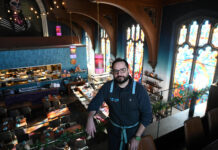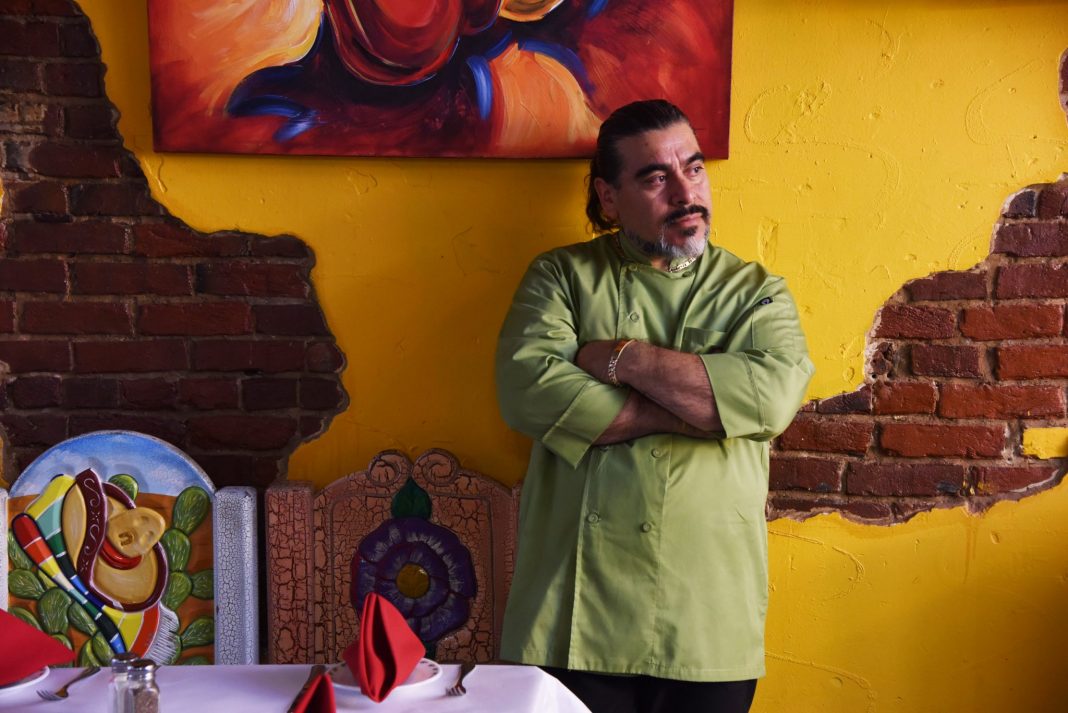1515 E. Market St., New Albany, IN | 812.725.9139
Americans are accustomed to salesmanship, so a smidgen of skepticism would be understandable when one menu-gazes at a Mexican restaurant and confronts for the first time ever a dish called Yolanda’s Amazing Chicken.
Trust me, this chicken platter really is amazing, but you’ll have to do some digging to reach the plump, juicy breast of chicken. It rests atop a bed of rice and is buried beneath layers of black beans, chorizo, spinach, mushrooms and onions, sealed tight with melted mozzarella, studded with grilled shrimp and finally drenched with a rich brown Mayan-inspired sauce.
(Originally published in the Winter 2019 issue of Food & Dining)
Welcome to Israel’s Delicias de Mexico Gourmet in New Albany, where chef, owner and namesake Israel Landin merrily improvises on a theme of traditional Mexican cuisine, unafraid to reinterpret recipes and deconstruct preconceived notions. Landin’s back story is amazing, too. And for the record, Yolanda is his wife.
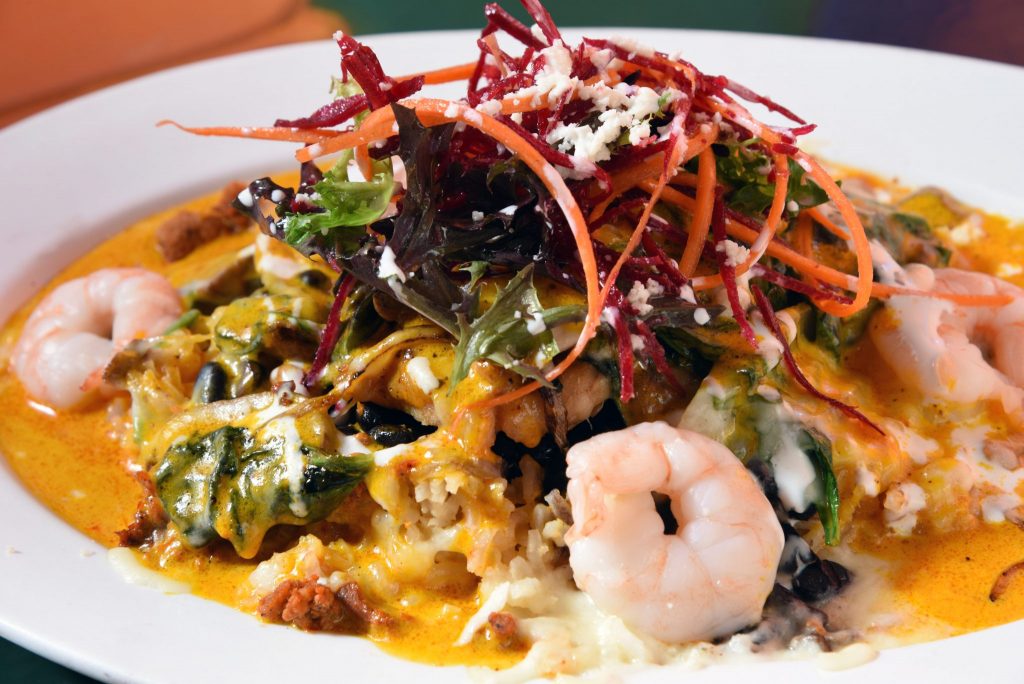
Fifteen years ago, Israel Landin came to New Albany from Chicago, leaving behind a two-decade career as a food wholesaler rep. He rented an unused corner space in a nondescript produce stand on the north side of town and debuted his very first taqueria, La Rosita.
La Rosita was small, utilitarian and barely decorated, certainly not to be confused with your grandad’s plasticized Chi’s Chi’s by the shopping mall. Landin, a native of Mexico City who’d been cooking since childhood, offered a basic menu of Mexican street food and promptly found himself utterly baffled as one customer after another asked for their food to be served “enchilada style.”
At first Landin had no idea what they meant, and he was surprised to learn that in Southern Indiana eatery dialect, “enchilada style” means “pour some red sauce over it.” This strange usage dates to the mid-1970s, when local entrepreneurs in New Albany created the first Tumbleweed, bringing us adapted Tex-Mex fare at a time when tacos still were crunchy school cafeteria food-fight ammunition and Corona was exported to America in brown bottles.
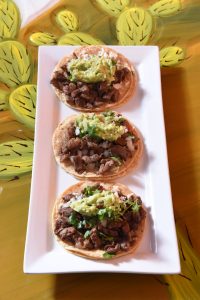
Landin quickly realized he’d be teaching his patrons as much as cooking for them, and so one tasty bite at a time, folks like me began learning about the joys of torta lengua (beef tongue) and campechana (Mexico’s glorious take on the seafood cocktail).
La Rosita was a delicious revelation, and by 2006 Landin had migrated his modest taqueria to larger digs in a 120-year-old former neighborhood grocery on Market Street.
The new La Rosita received rave reviews and was financially successful, so Landin expanded yet again with far bigger restaurant operations in New Albany and Louisville. Unfortunately, those ventures turned out to be missteps that coincided with the Great Recession, and Landin lost it all, not to be seen in town for a while. Happily, in 2015 our prodigal adopted foodie son returned to the Market Street building uptown with a new name and a creative, chef-driven menu.
I asked Landin to explain what has changed from his La Rosita days.
“Just about everything,” he replied. “It’s completely different now. I’m working with gourmet techniques, more seafood and some Mayan dishes, and of course with my own touches. Day by day I come up with new dishes. Before we had mom-and-pop food, street food like Mexican homemade gorditas and pambazos. Now I want to focus more on gourmet Mexican cuisine.”

For Landin, “gourmet” is a non-ironic, recurring adjective, embodying two key definitions. Landin’s ingredients must be of uniformly high quality, and their use remains subject to his kitchen skill-set and artistry as a chef. Authenticity matters, but his muse matters more.
Prior to arriving in the United States in 1985, Landin worked in Mexico as a butcher. Then he relocated to Chicago, where he continued his culinary education by selling wholesale cheese, frozen foods, seafood and imported foods.
Later Landin returned to Mexico for culinary coursework, making time to continue his education even during the peak of La Rosita’s popularity. He’d be gone for a while, then reappear with new spices, textures, discoveries and techniques.
“I’m going to stick to what I’ve learned, to what I’ve always believed, that food is an art,” Landin told me. “You have to offer people what you think they can eat from the plate, not something that doesn’t look like food. If I can eat it, they’ll be able to eat it, and they’ll say ‘whoa — we’re happy we came to this place.’”
As a case in point, consider Landin’s signature Holy Guacamole. He tops fresh avocado, onion and cilantro dip with diced mango and pineapple, chorizo and cubes of fresh white panela cheese. Ordinarily these items would be served in small bowls or on plates, like amuse-bouche. Landin thought to combine them, and it’s a new spin on an old favorite.
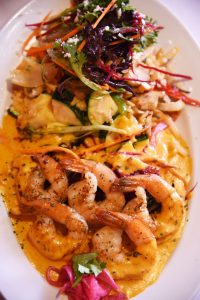
Another example is Camarones a la Diabla (“devil’s shrimp”). At the La Rosita of old, Landin served this spicy staple somewhat in accordance with tradition. “In Mexico they’ll serve it to you with a dry red sauce, spicy with certain chiles,” he explained. “The way I do it now is with a creamy habanero sauce. It’s a step up in ingredients and presentation, and I make magic with them.”
The same is true for Landin’s Camarones con Arroz, in which the rice receives equal billing with the shrimp. He combines regular and brown rice pilaf and couscous to conjure a creamy risotto-like mix, then uses a special sauté for the shrimp in this dish alone.
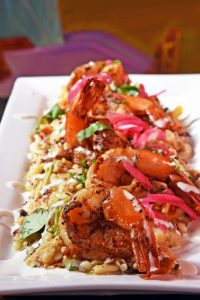
I may be biased as a New Albany resident, but it’s clear that Israel Landin has taught a generation of diners first to appreciate the diversity of authentic Mexican cuisine (at La Rosita), and then at Israel’s Delicias de Mexico Gourmet to grasp the broader range of its possibilities when in the hands of a gifted chef.
Perhaps the bond we feel with him stems from knowing that, from the start, we’ve been learning together. F&D



